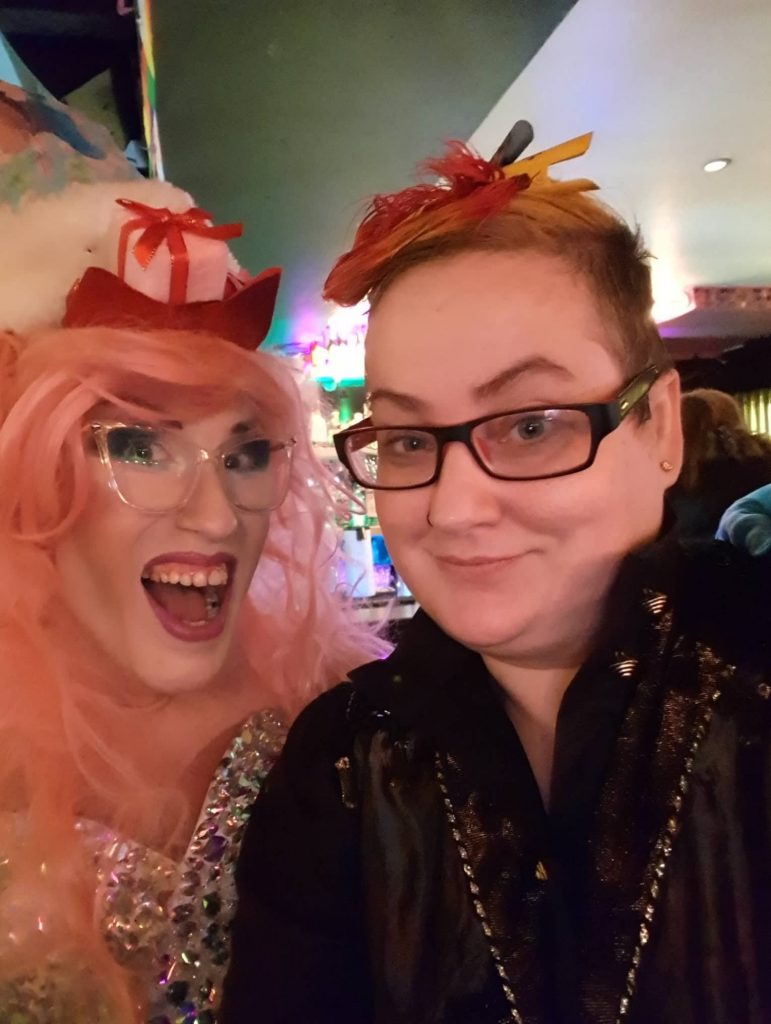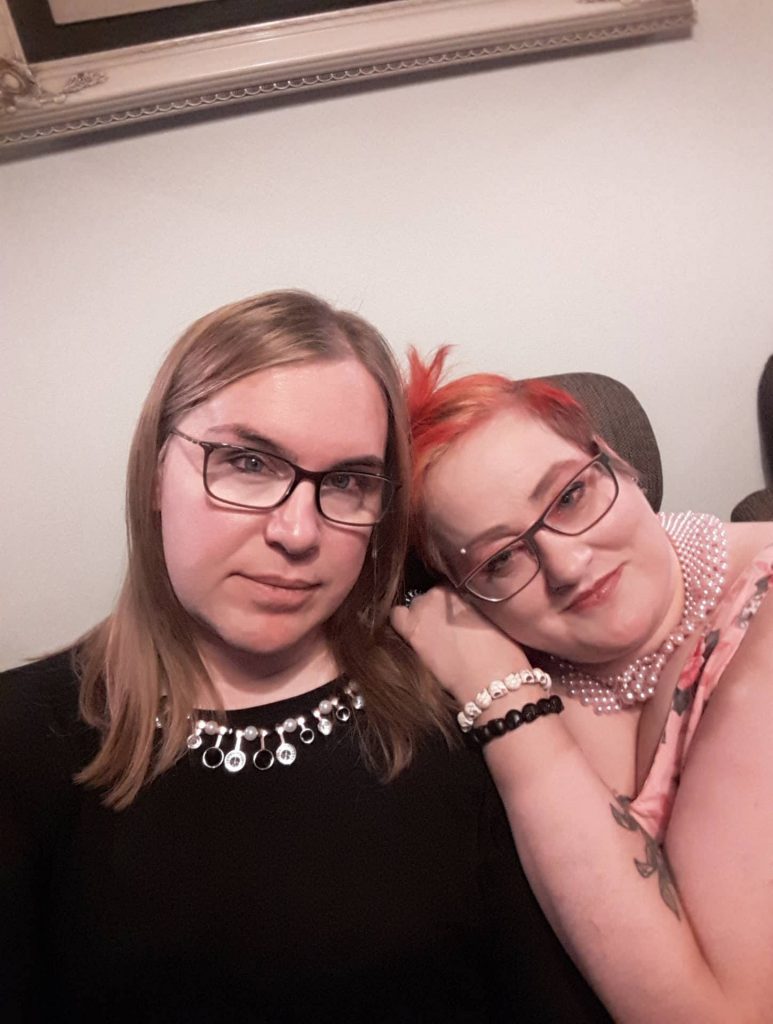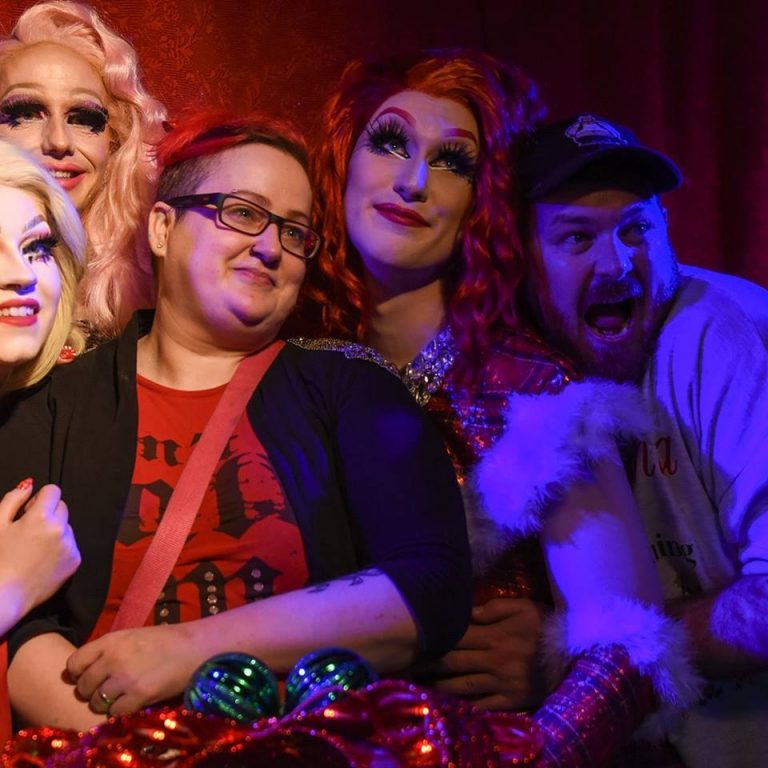Meet the queer disabled woman who has become a national hero in Iceland after exposing the prejudice of parliementarinas towards women and minority groups.

Bára Halldórsdóttir has become a national hero after she recorded six members of parliament making derogatory comments about women, queer people and people with disabilities in a bar in downtown Reykjavik at the end of November. Those comments made by parliamentarians from the Centre Party and the People’s Party, including former Prime Minister Sigmundur Davíð Gunnlaugsson, have spawned a major political scandal dubbed Klausturgate – after the Klaustur Bar where the conversations were recorded – including calls for the six MPs to resign.
Although at first Bára shared the recordings anonymously with the media, she decided to go public at the beginning of December, because she felt it was important for the public to know that, not only was she a woman, but she was also queer and disabled. “I thought that I needed to get at least that into the media,” she tells GayIceland. “That the person who recorded this fits the profile of the people who were mentioned and humiliated in these conversations.” Bára became a household name almost overnight and prompted the four Centre Party MPs in the recording to launch a court case against her.
GayIceland caught up with Bára after the Reykjavík District Court rejected the case against her and started by asking if she anticipated any of this when she first recorded that conversation.
“Not at the level that it’s become, but I did anticipate that I would not be very popular with the people I recorded. When I gave my recording away from me, I gave it to the journalists unedited, so I wasn’t really sure which issues would be broached or if any of them would be publishable.”
Have you always been an activist?
“This is my first taste of this kind of activism, but I have been active for quite a few years in poverty issues and disability issues and trans issues and more. I haven’t had as much energy as I would have wanted to in that department, but I have very strong views and very strong convictions in that area. My mother says that I was always up against everything and everyone when I was a kid. But this is quite a bit bigger than anything that I’ve done before.”
Asked what was it about that conversation she overheard at the Klaustur Bar that compelled her to take action, Bára replies that she thinks that moment actually came long after she did the recording. At first she recorded it out of a reaction. “I knew that I needed to have it on tape that this was happening, I knew that I had to discuss this with somebody. I wasn’t at first sure where the pathway for it was, and it just took me a few days to realize that I would never be able to go through the material myself and that I really wanted somebody to see if any of this was usable, and that’s when I decided to send it to the news media.”
“You get hurt, you get angry, you feel powerless. The hardest thing about this is how used you are to it.”
How did it feel for you as a queer woman with a disability to hear these politicians say these things?
“The same reaction as in the million times I’ve heard this before. You get hurt, you get angry, you feel powerless. The hardest thing about this is how used you are to it. At any other moment, if it was just somebody out for a night on the town, Jón Jónsson who isn’t a parliamentarian or anything, I would’ve just walked over and said, ‘I hope your mom’s not hearing what you’re saying right now and I’m very offended,’ and then I would leave. So it didn’t surprise me what they were saying, but it did surprise me that they were talking like that in close ranks to other people, very loudly, very boisterously, and not feeling that it was inappropriate at all.”
The challenges of being queer and disabled
Bára has a chronic illness called Behcets which is a chronic autoimmune and arthritis disease. She’s only been diagnosed for five or six year, but says when she looks back she probably first started experiencing symptoms of her disability around the end of her teenage years. She’s been quite sick for about 18 years, and she’s been very sick for about eight years. She explains that her disability is very much because of pain and restriction of movement and tiredness and stuff like that connected to Behcets. She also have very varying levels of disability depending on how much her disease is active. It mimics other diseases, so she’s had things like pseudo-meningitis, which means that she gets all the symptoms of a meningitis, but there’s no infection that started it. Her immune system just decided to react to something that wasn’t there. She says it’s very disruptive.

Asked how well she thinks Iceland is when it comes accessibility for people with disabilities, she says it’s not doing quite well enough. “For example, our main shopping street, if you go down it, there are probably three stores that a person in a wheelchair could go into on the whole street,” she explains and adds that she thinks a lot of it is lack of knowledge. “Before I became disabled I thought it was much, much better than it is. And it’s kind of shocking when you realize how limited you become. I have a few friends who I might visit once a year and then I would have to take a day off afterwards just because they’re on the fifth floor of an elevator-less apartment. Two of my favourite nightclubs that I would go to have quite impressive stairs that I have to choose to go or not to go. There’s progress being made and so on and so forth, but there’s a lot of stalling in the system too.”
But what does her family make of everything that has happened since she recorded that conversation in Klaustur Bar?
“I have a wonderful family, everybody, my son and my wife are about the most supportive people I’ve ever known, and I have my extended friend family and my mother and father who have been very supportive too.”
Your wife and son are both trans. What kind of challenges does your family face living in Iceland?
“I don’t know if it’s lack of people or lack of urgency, but the health system is very slow when it comes to trans issues. It’s so much better than in many other countries, but it’s not as good as it could be. It’s still based on the fact that you need to be diagnosed with a mental disease, and there’s all sorts of things that I’d like to see done faster and more efficiently.”
What kind of connection do you see between the comments made by those politicians and the challenges that you and your family face?
“There are always connections. A few years ago, I attended a conference where there was a person who has darker skin, there was a person who is fatter, there was a person who is disabled, there was a trans person, and there were some other groups that I can’t remember at the moment. But I felt we were all talking about the same obstacles in a way, even though they were in different systems. We all have to deal with not fitting into the box. And if you walk into the room and you declare yourself to be not the norm, you always have to deal with something instead of it just being something that people accept. It depends on what kind of room you’re walking into, but there is always this feeling of otherness.”
Prejudice against people who are bisexual
What needs to change? “I hope visibility helps. I’ve always felt that the fastest way away from problems like this is ongoing discourse and actually getting to know people who are different, instead of just categorizing them. Take some of the older people I’ve known as an example, they might have had very strong opinions when I was younger about gays and lesbians, and then somebody in the family came out as gay or lesbian and then they suddenly started to understand it. I’ve always felt that if you see the love, if you see the humanity in people you could erase a lot of these problems. But the world’s never going to be perfect, that’s just what it is. I’ve always been on the edge of everything, I’m on the edge of the queer community. I’m bisexual, or pansexual probably, this new definition that seems to fit me. I remember not really fitting into the queer community either.”
“For a very long time, and to some point still, bisexual people have been seen as not really queer.”
What do you mean by feeling outside the queer community?
“For a very long time, and to some point still, bisexual people have been seen as not really queer or just on the way out or just on the way in. I remember when I was younger here, people thought no lesbian should date a bisexual woman, she would just leave her for a man. And then just half a year ago, a friend of mine who recently came out as a lesbian repeated this from somebody who said it to her, and we are 20 years apart in the gay community. So it’s obviously there still.”
Doesn’t feel like she deserves being Person of the Year
Bára has recently been voted for Person of the Year. How does that make her feel?
“It’s an honor but it also feels a bit silly to think of yourself in that situation. I know I had an impact and so on, but in a very weird way I feel I don’t deserve it. So I’m very grateful of course that people feel that I deserve it, but I feel very, very strange about it.”
What’s next for you and for this movement that you’ve started?
“Well, personally I’m just waiting for what will happen in the court case. We won the first stage and they have a right to appeal, which they have. So it’s in a bit of a limbo until we know what the next stage is. I’m very much hoping that the focus will be kept on the issues that arose from the conversations, that that doesn’t get lost. Hopefully the discussion and everything that comes from this will be a place to grow from.”
Main photo / Lovísa Sigurjónsdóttir


